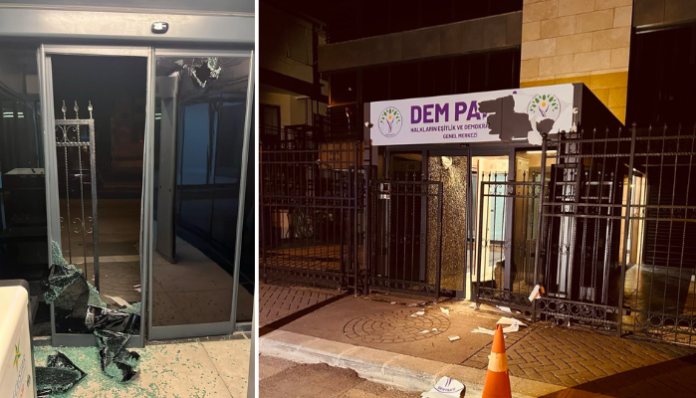A late-night attack targeted the headquarters of the pro-Kurdish Peoples’ Equality and Democracy Party (DEM Party) in Ankara on Thursday, following recent political tensions, the Kronos news website reported.
According to initial reports the attacker broke several windows of the DEM Party headquarters and attempted to tear down the party’s signage. The attack occurred in Balgat, home to many political party headquarters, raising concerns over security in the area.
“We want to remind this pitiful mindset, seeking provocation, that it cannot intimidate or stop us,” DEM Party spokesperson Ayşegül Doğan said in a social media post. “We call on Interior Minister Ali Yerlikaya to take immediate action to identify and address the perpetrators.”
Police apprehended and detained an individual identified only by the initials H.C.Ö., who is suspected of carrying out the attack.
The incident follows a series of events involving Nationalist Movement Party (MHP) leader Devlet Bahçeli and the outlawed Kurdistan Workers’ Party (PKK) leader Abdullah Öcalan.
The tensions began when Bahçeli, a key ally of President Recep Tayyip Erdoğan, suggested during a party meeting on Tuesday that if Öcalan’s “isolation” were lifted, he could appear at the party group meeting of the DEM Party and declare the dissolution of the PKK, signalling an end to decades of violence.
The “isolation” of Öcalan, who has been jailed in a high-security prison on İmralı Island in the Sea of Marmara since 1999, refers to his inability to speak with his lawyers for years.
This move was followed closely by an attack on the Turkish Aerospace Industries (TUSAŞ) facility in Ankara. The attack, which occurred just a day after Bahçeli’s invitation, resulted in five deaths and sparked widespread debate over its timing.
Located in the Sea of Marmara, the island prison of İmralı has been where the founding leader of the PKK has spent the last 25 years. He is serving an aggravated life sentence handed down on charges of treason and separatism.
In a statement on Friday the PKK claimed responsibility for the TUSAŞ attack, emphasizing that the operation had been “planned long ago” and was “not related to the recent political discussions in Turkey.” However, the timing of the incident has raised significant public scrutiny and political criticism.
The evolving situation has echoes of Turkey’s previous attempt at a peace process that collapsed in 2015. At that time, President Recep Tayyip Erdoğan engaged in negotiations with Öcalan, announcing a 10-point agreement that envisioned reforms loosening restrictions on Kurdish identity in return for the PKK laying down its arms. However, the peace process unraveled due to a combination of geopolitical factors, including US support for Syrian Kurdish groups in the fight against the Islamic State, as well as internal resistance from the Turkish military and Erdoğan’s far-right ally, the Nationalist Movement Party (MHP).
Since the 1980s the PKK has been leading an insurgency that has claimed the lives of some 40,000 people in Turkey. The group is designated as a terrorist organization by Turkey and its Western allies.















